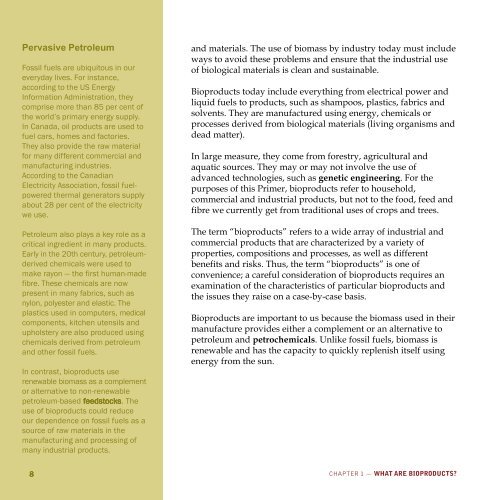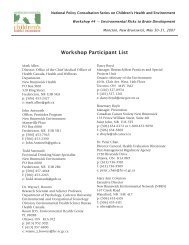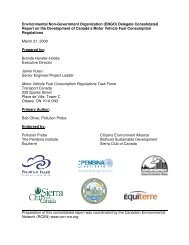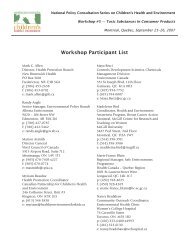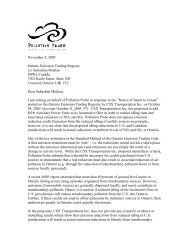Primer on Bioproducts - BIOCAP Canada
Primer on Bioproducts - BIOCAP Canada
Primer on Bioproducts - BIOCAP Canada
You also want an ePaper? Increase the reach of your titles
YUMPU automatically turns print PDFs into web optimized ePapers that Google loves.
Pervasive PetroleumFossil fuels are ubiquitous in oureveryday lives. For instance,according to the US EnergyInformati<strong>on</strong> Administrati<strong>on</strong>, theycomprise more than 85 per cent ofthe world’s primary energy supply.In <strong>Canada</strong>, oil products are used tofuel cars, homes and factories.They also provide the raw materialfor many different commercial andmanufacturing industries.According to the CanadianElectricity Associati<strong>on</strong>, fossil fuelpoweredthermal generators supplyabout 28 per cent of the electricitywe use.Petroleum also plays a key role as acritical ingredient in many products.Early in the 20th century, petroleumderivedchemicals were used tomake ray<strong>on</strong> — the first human-madefibre. These chemicals are nowpresent in many fabrics, such asnyl<strong>on</strong>, polyester and elastic. Theplastics used in computers, medicalcomp<strong>on</strong>ents, kitchen utensils andupholstery are also produced usingchemicals derived from petroleumand other fossil fuels.In c<strong>on</strong>trast, bioproducts userenewable biomass as a complementor alternative to n<strong>on</strong>-renewablepetroleum-based feedsteedstocksocks. Theuse of bioproducts could reduceour dependence <strong>on</strong> fossil fuels as asource of raw materials in themanufacturing and processing ofmany industrial products.and materials. The use of biomass by industry today must includeways to avoid these problems and ensure that the industrial useof biological materials is clean and sustainable.<strong>Bioproducts</strong> today include everything from electrical power andliquid fuels to products, such as shampoos, plastics, fabrics andsolvents. They are manufactured using energy, chemicals orprocesses derived from biological materials (living organisms anddead matter).In large measure, they come from forestry, agricultural andaquatic sources. They may or may not involve the use ofadvanced technologies, such as genetic engineering. For thepurposes of this <str<strong>on</strong>g>Primer</str<strong>on</strong>g>, bioproducts refer to household,commercial and industrial products, but not to the food, feed andfibre we currently get from traditi<strong>on</strong>al uses of crops and trees.The term “bioproducts” refers to a wide array of industrial andcommercial products that are characterized by a variety ofproperties, compositi<strong>on</strong>s and processes, as well as differentbenefits and risks. Thus, the term “bioproducts” is <strong>on</strong>e ofc<strong>on</strong>venience; a careful c<strong>on</strong>siderati<strong>on</strong> of bioproducts requires anexaminati<strong>on</strong> of the characteristics of particular bioproducts andthe issues they raise <strong>on</strong> a case-by-case basis.<strong>Bioproducts</strong> are important to us because the biomass used in theirmanufacture provides either a complement or an alternative topetroleum and petrochemicals. Unlike fossil fuels, biomass isrenewable and has the capacity to quickly replenish itself usingenergy from the sun.8CHAPTER 1 — WHAT ARE BIOPRODUCTS?


